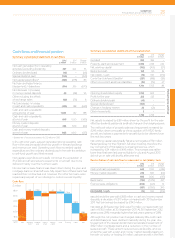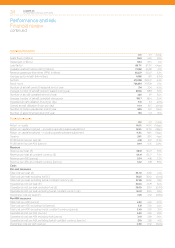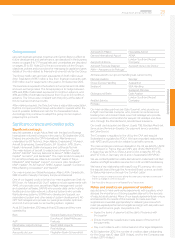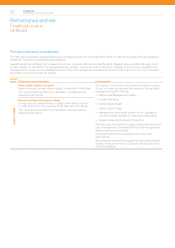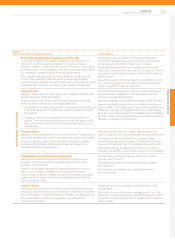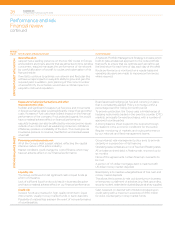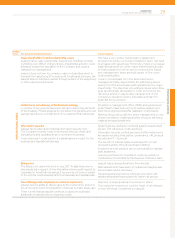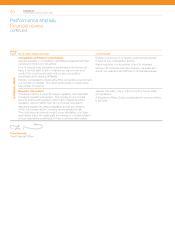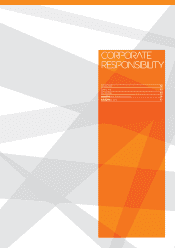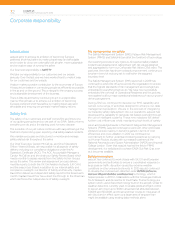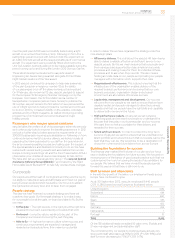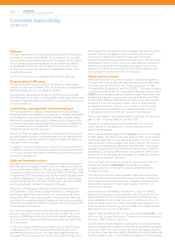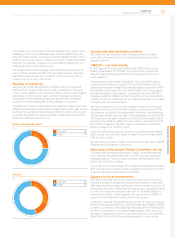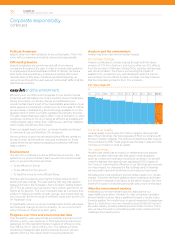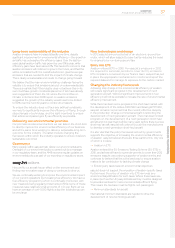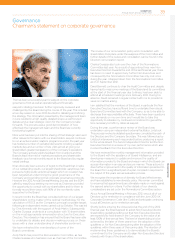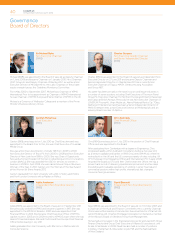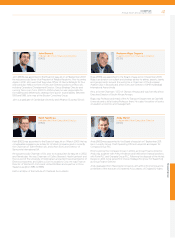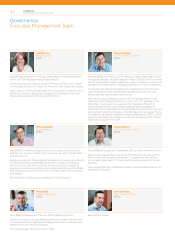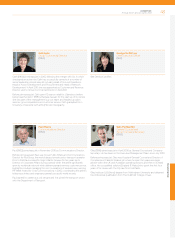EasyJet 2012 Annual Report Download - page 35
Download and view the complete annual report
Please find page 35 of the 2012 EasyJet annual report below. You can navigate through the pages in the report by either clicking on the pages listed below, or by using the keyword search tool below to find specific information within the annual report.
Over the past year AVOID was successfully tested using a light
aircraft on an active Mount Etna in Sicily. Following on from this, a
partnership was announced with Airbus to test the equipment on
an A340-300 test aircraft at the speed and altitude of commercial
aircraft. The equipment was successfully fitted which led to the
UK’sCivil Aviation Authority asking it to be made available during the
period running up to and during the London 2012 Olympic Games.
These latest developments also led to easyJet’s Head of
Engineering Ian Davies being awarded, alongside Dr Fred Prata,
Flight Global’s Aviators of the Year award.
In 2012 easyJet continued its campaign to help raise awareness
ofthe pan-European emergency number 112 as the safety
ofourpassengers once off the plane remains just as important.
On11February, also known as 112 day, easyJet pledged its support
for the European 112 Emergency Number campaign run by the
European Commission, the 112 Foundation and a number of
transportation companies (airlines, trains, ferries) to publicise the
112number. easyJet remains the first airline to have pioneered the
use of inflight services to help promote the number and continued
to do so in 2012 by increased visibility on the website, corporate
activities and its in-flight magazine, as well as introducing a rolling
programme of on-board announcements ahead of major
holidayperiods.
Passengers who require special assistance
easyJet takes the welfare of all of its passengers extremely seriously
as it continuously looks to improve the travelling experience. In 2012
we took a further step to better assess the requirements of our
300,000 passengers requiring special assistance. Following on from
continued improvements to service delivery, we looked closely at
upgrading the training provided to our staff on the ground and in
the air by reviewing existing courses and calling upon the support of
the special assistance and disabled community to do so. We have
worked with several leading experts and associations from across
Europe including Guide Dogs UK and the French association APAJH
(Association pour Adultes et Jeunes Handicapés) to help do this.
We have also set up a special advisory group – the easyJet Special
Assistance Advisory Group (ESAAG) – and chaired by the Right
Honourable David Blunkett MP to help fully oversee these changes.
Our people
Our people are at the heart of our business and they are the key to
our ability to make travel easy and affordable and meet our goal of
being Europe’s preferred short-haul airline. Our focus is to attract
theright person at every level, and to keep them engaged.
People strategy
This year we have reviewed our people strategy and have set
ourselves clear goals. Our three-part strategy is to make it easy
forour people to be at the gate, on-board and able to fly. By this
wemean:
A At the gate – The right people, in the right job at the right time
equipped to succeed, supported by processes that work.
A On-board – Living the values, wanting to be part of the
Company’s success and knowing the part they play.
A Able to fly – A high-performance culture where success and
continuous improvement are expected, managed and
rewarded and people achieve their maximum potential.
In order to deliver this we have organised the strategy under five
core strategic pillars.
A HR service delivery. This is all about the easyJet HR team being
able to deliver a reliable, effective and efficient service to our
easyJet people. By this we mean ensuring that our people and
their managers are supported by clear, simple and accurate
processes and making it easy for them to understand these
processes and to ask when they need to. This also means
holding accurate data on our people and providing our people
managers with information which supports their roles.
A Organisational effectiveness. This is about ensuring that the
infrastructure of the organisation enables delivery of the
required business performance and ensuring that our core
business processes, organisation design and physical
environment are all enablers of business success.
A Leadership, management and development. Our success
willcome from our people so we want to ensure that we have
capable leaders and people managers to drive the business
agenda, and that our people have the right skills and capability
to deliver both now and in the future.
A High performance culture. At easyJet we set ourselves
stretching goals and we want our people to understand the
keypart that they play in our business plan and our success.
Wewant them to feel accountable for their delivery and
rewarded for their success.
A Talent and succession. In order to protect the long-term
success of easyJet we want to ensure that we understand our
talent portfolio and nurture this such that our people can be the
best that they can be. We would like to be a destination of
choice forcurrent and future talent from across Europe.
Building the foundations for success
This financial year marked the first year of our plan and our focus
was on building the foundations for future success. We focused on
reviewing some of the basics of good people practice such that we
could improve them and on sowing the seeds of our ambitions for
our people. We believe that we have moved the people agenda
forward this year and that there is still more to do.
Staff turnover and attendance
In line with the growth of the airline, our employment levels across
Europe have continued to grow.
As at 30 September 2012, easyJet employed 8,446 people
(2011: 8,288) based across Europe as illustrated below:
United Kingdom 5,132
Switzerland 698
France 840
Spain 583
Italy 822
Germany 294
Netherlands 1
Portugal 76
Total 8,446
Of the 158 additional heads we added 56 cabin crew, 51 pilots and
51new management and administration staff.
The commitment by our people to working at easyJet was very
strong with staff attendance at 95% for 2012 (FY 2011: 96%), and
staff turnover decreasing to 7.5% (FY 2011: 9.7%).
Corporate responsibility
easyJet plc
Annual report and accounts 2012 33


